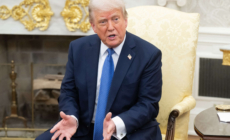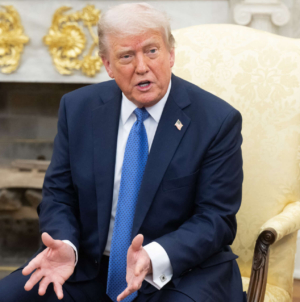-
Donald Trump Reveals Russia’s ‘Pretty Big Concession’ in Peace Talks with Ukraine - 15 mins ago
-
Damage from CoolSculpting procedure left model Linda Evangelista in therapy - 19 mins ago
-
Can Stephen Curry carry the Golden State Warriors if Jimmy Butler’s injury lingers? | The Herd - 42 mins ago
-
Southern California’s Catholic leaders reflect on Pope Francis - 54 mins ago
-
Zurich Classic Field Weakened as 8-Time PGA Tour Winner Withdraws via Injury - 56 mins ago
-
Soccer player’s wife and child kidnapped in Ecuador during home invasion - about 1 hour ago
-
NFL Draft first overall picks: Complete list by year - about 1 hour ago
-
SoCal police find stolen Hank Aaron jersey, $500,000 in sports cards - 2 hours ago
-
Republican Governor Rebukes GOP Effort to ‘Legislate Morality’ - 2 hours ago
-
The Duchess of Sussex addressed Netflix show controversy - 2 hours ago
Trump says the U.S. and China are ‘actively’ discussing tariffs. Beijing says that’s false.
“I don’t think either side believes that the current tariff levels are sustainable, so I would not be surprised if they went down in a mutual way,” he told reporters Wednesday in Washington.
Trump, meanwhile, said that “everybody wants to be a part of what we’re doing” and that the U.S. and China had direct contact on trade “every day.”
A senior administration official told NBC News on Wednesday that the U.S. is speaking with China on tariffs but at a low level that has not involved Cabinet officials.
The mixed messaging came a day after Trump made comments that were interpreted as a potential softening toward Beijing.
Rather than playing hardball with China, the U.S. is “going to be very nice” and the final tariffs “will not be anywhere near” the current 145%, the president told reporters Tuesday.
White House press secretary Karoline Leavitt denied Trump was softening his tone, telling Fox News that “there will be no unilateral reduction in tariffs against China.”
Those comments poured cold water on U.S. stocks, which pared earlier gains Wednesday and slipped in premarket trading Thursday. Asian markets ended Thursday mixed, while European indexes fell in early trading.
The suggestion that tariffs could soon come down “reflects the pain that these tariffs have imposed and are likely to impose on U.S. businesses and U.S. customers, if continued,” said Lee Branstetter, a professor of economics and public policy at Carnegie Mellon University.
Talking about tariff reductions before winning any concessions from China or even starting serious talks looks like a climbdown, Branstetter said.
“That, to me, is consistent with the view that the president did not really think through the consequences of his tariff decisions,” he added. “They have now become much more evident to him.”
Growing impact
The impasse between the U.S. and China is causing growing anxiety as the implications become clearer. This week, the International Monetary Fund slashed growth forecasts for the U.S., China and most other countries, citing the effect of U.S. tariffs.
The White House is also increasingly concerned about possible shortages on U.S. retail shelves as orders begin for the holiday season at the end of the year.
A spokesperson for Hapag-Lloyd, a Germain container shipping group, said Thursday that its customers had canceled 30% of shipments to the United States from China over concerns about their trade dispute.
After a similar battle over tariffs in Trump’s first term, China — which has long been preparing for a second trade war with the U.S. president — has not rushed to offer concessions or set up meetings with U.S. trade officials.
Source link































